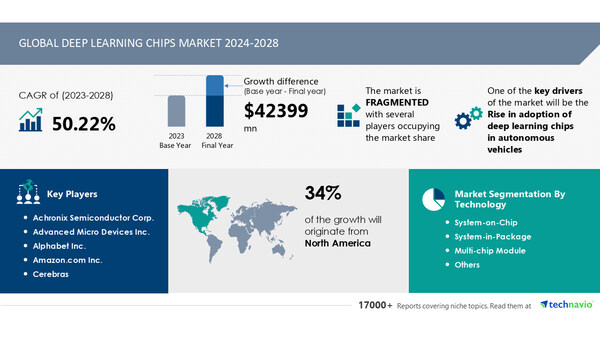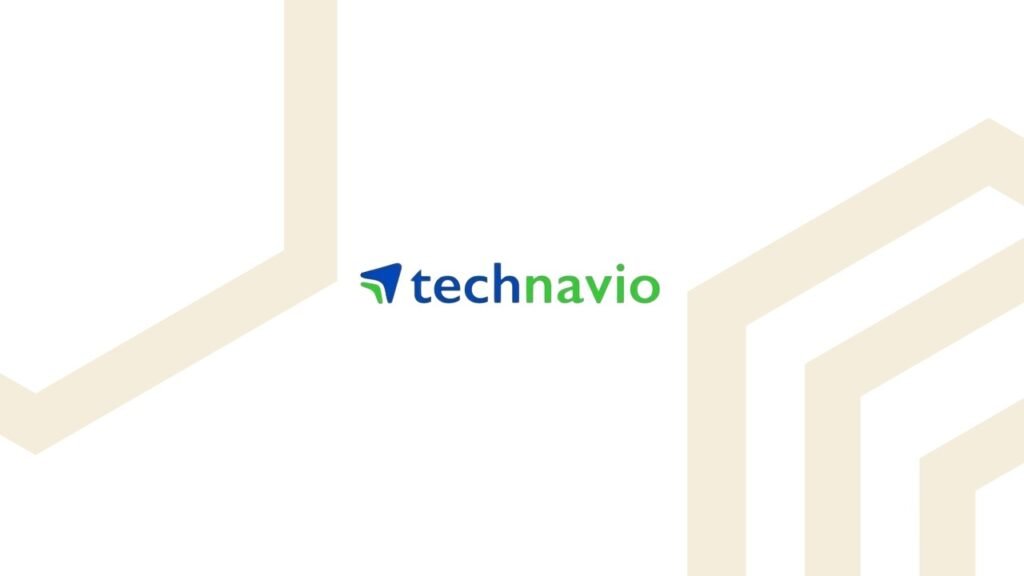NEWS PROVIDED BYTechnavio
Jul 12, 2024, 10:24 ET
NEW YORK, July 12, 2024 /PRNewswire/ — The global deep learning chips market size is estimated to grow by USD 42.39 billion from 2024-2028, according to Technavio. The market is estimated to grow at a CAGR of 50.22% during the forecast period. Rise in adoption of deep learning chips in autonomous vehicles is driving market growth, with a trend towards advances in quantum computing. However, dearth of technically skilled workers for deep learning chip development poses a challenge. Key market players include Achronix Semiconductor Corp., Advanced Micro Devices Inc., Alphabet Inc., Amazon.com Inc., Cerebras, China Cambrian Technology Co. Ltd., Flex Logix Technologies Inc., Fujitsu Ltd., Graphcore Ltd., Groq Inc., Intel Corp., International Business Machines Corp., MediaTek Inc., NVIDIA Corp., Qualcomm Inc., Samsung Electronics Co. Ltd., Synopsys Inc., Syntiant Corp., Taiwan Semiconductor Manufacturing Co. Ltd., and ThinkForce.

Get a detailed analysis on regions, market segments, customer landscape, and companies – Click for the snapshot of this report
| Forecast period | 2024-2028 |
| Base Year | 2023 |
| Historic Data | 2018 – 2022 |
| Segment Covered | Technology (System-on-Chip, System-in-Package, Multi-chip Module, and Others), End-user (BFSI, IT and telecom, Media and advertising, and Others), and Geography (North America, Europe, APAC, South America, and Middle East and Africa) |
| Region Covered | North America, Europe, APAC, South America, and Middle East and Africa |
| Key companies profiled | Achronix Semiconductor Corp., Advanced Micro Devices Inc., Alphabet Inc., Amazon.com Inc., Cerebras, China Cambrian Technology Co. Ltd., Flex Logix Technologies Inc., Fujitsu Ltd., Graphcore Ltd., Groq Inc., Intel Corp., International Business Machines Corp., MediaTek Inc., NVIDIA Corp., Qualcomm Inc., Samsung Electronics Co. Ltd., Synopsys Inc., Syntiant Corp., Taiwan Semiconductor Manufacturing Co. Ltd., and ThinkForce |
Key Market Trends Fueling Growth
The rapid adoption of smart devices and increasing automation are driving the generation of vast amounts of unstructured data. Processing this data demands hardware with advanced computational abilities. While conventional computers have seen significant processing speed improvements, they are still insufficient for handling the data deluge. Consequently, market players worldwide are investing heavily in quantum computing technology. Quantum computing uses quantum mechanics principles to achieve higher computational power, with qubits being the primary difference from conventional bits. Qubits exist in multiple states at once, enabling quantum computers to perform simultaneous calculations, a concept known as quantum parallelism. This technology is gaining traction in AI, ML, and Big Data due to its speed advantages. However, building powerful quantum computers necessitates the development of efficient deep learning chips. The focus on creating algorithms and procedures for quantum computing will lead to the development of these chips, fueling the growth of the deep learning chip market during the forecast period.
The Deep Learning Chips Market is experiencing significant growth due to the increasing demand for advanced technologies like voice recognition, speech synthesis, machine translation, game playing, drug discovery, robotics, and more. Silicon chips are at the heart of this trend, with technology companies investing heavily in AI hardware such as neural network processors, machine learning chips, artificial intelligence accelerators, and deep learning accelerators. Chip types include GPU chips, CPU chips, ASIC chips, FPGA chips, and hardware accelerators. Edge computing chips and cloud computing chips are also in high demand for delivering real-time processing and data center solutions. Industry verticals like media & advertising, IT & telecom, healthcare, automotive & transportation, working from home, supply chain, stock market, and business confidence are major consumers of these chips. The skilled workforce is essential for bug fixing and cloud implementation, while manufacturing units ensure timely delivery. Quantum computing chips are a future trend, while neuromorphic computing chips are gaining traction for their ability to mimic the human brain.
Discover 360° analysis of this market. For complete information, schedule your consultation- Book Here!
Market Challenges
- The deep learning chip market is experiencing rapid growth due to increasing demand for advanced technologies in various industries such as healthcare, transportation, finance, and security. However, the development of deep learning chips faces a significant challenge: a shortage of skilled workers. This shortage can be attributed to the newness of the field, requiring specialized technical expertise in areas like electrical engineering, computer science, machine learning, data analysis, and proficiency in programming languages such as Python and C++. Few universities and technical schools offer specialized programs in deep learning chip development, resulting in a limited pool of graduates with the necessary skills. The high demand for deep learning chips intensifies competition among companies for skilled workers, driving up salaries, benefits, and incentives. Smaller companies may struggle to compete, potentially hindering the growth of the global deep learning chip market.
- The Deep Learning Chips Market is experiencing significant growth due to the increasing demand for AI hardware solutions. Neural network processors, machine learning chips, and artificial intelligence accelerators are driving this market forward. However, challenges exist in the form of GPU and CPU chips, which while effective, are not optimized for deep learning. ASIC, FPGA, and hardware accelerators offer alternatives, but come with their own complexities. Edge computing and cloud computing chips, data center chips, and neuromorphic computing chips are also in play. Innovations in AI chip architectures, design, manufacturing, testing, validation, integration, optimization, performance, scalability, efficiency, reliability, and security are key. AI chip vendors and startups are pushing boundaries with new applications, technologies, and solutions in machine learning, computer vision, and more. The goal is to create efficient, reliable, and secure AI chips for various industries and applications.
For more insights on driver and challenges – Download a Sample Report
Segment Overview
This deep learning chips market report extensively covers market segmentation by
- Technology
- 1.1 System-on-Chip
- 1.2 System-in-Package
- 1.3 Multi-chip Module
- 1.4 Others
- End-user
- 2.1 BFSI
- 2.2 IT and telecom
- 2.3 Media and advertising
- 2.4 Others
- Geography
- 3.1 North America
- 3.2 Europe
- 3.3 APAC
- 3.4 South America
- 3.5 Middle East and Africa
1.1 System-on-Chip- System-on-Chips (SoCs) are gaining popularity due to their versatility, power, and efficiency in handling complex computational tasks, particularly in deep learning applications. SoCs are highly integrated microchips that combine all necessary components, such as processing and communications, onto a single piece of silicon. This integration is beneficial for deep learning as it integrates CPUs, GPUs, and necessary memory on a single chip, enhancing performance and energy efficiency. The SoC’s architecture can be customized and optimized to meet specific device or application needs, making it a flexible and adaptable technology. Its real-time processing capabilities are essential for deep learning applications, such as autonomous vehicles, healthcare, retail, and manufacturing, which require handling massive amounts of data and executing complex algorithms. SoCs enable real-time processing, necessary for efficient decision-making in autonomous vehicles, and transfer of large datasets, improving deep learning performance. The SoC segment’s growth in the global deep learning chips market is expected to increase due to these advantages, making it an attractive option for device manufacturers.
For more information on market segmentation with geographical analysis including forecast (2024-2028) and historic data (2018 – 2022) – Download a Sample Report
Research Analysis
The Deep Learning Chips Market refers to the industry dedicated to producing specialized hardware for accelerating artificial intelligence (AI) workloads, including neural network processors, machine learning chips, artificial intelligence accelerators, deep learning accelerators, and various types of chips optimized for AI inference and training. These chips come in various forms such as GPU chips, CPU chips, ASIC chips, FPGA chips, high-performance computing chips, embedded AI chips, low-power AI chips, and neural processing units. AI chip integration and optimization are crucial for enhancing performance, scalability, efficiency, reliability, and security. AI chip applications span across industries, including healthcare, finance, automotive, gaming, and consumer electronics. Continuous innovations in AI chip technologies are driving the market’s growth, enabling faster and more accurate AI processing.
Market Research Overview
The Deep Learning Chips Market encompasses a range of hardware solutions designed to accelerate artificial intelligence (AI) and machine learning (ML) workloads. These chips include neural network processors, machine learning chips, artificial intelligence accelerators, deep learning accelerators, GPU chips, CPU chips, ASIC chips, FPGA chips, hardware accelerators, edge computing chips, cloud computing chips, data center chips, neuromorphic computing chips, quantum computing chips, parallel processing chips, high-performance computing chips, embedded AI chips, low-power AI chips, AI inference chips, AI training chips, on-device AI chips, neural processing units, AI co-processors, and various AI chip architectures. The market also involves AI chip design, manufacturing, testing, validation, integration, optimization, performance, scalability, efficiency, reliability, security, and various chip types such as System-on-chip (SoC), System-in-package (SiP), and Multi-chip module (MCM). Applications of these chips span across various industry verticals including media & advertising, IT & telecom, healthcare, automotive & transportation, working from home, supply chain, stock market, business confidence, and manufacturing units. The market is driven by the increasing demand for AI and ML in computer vision, voice recognition, speech synthesis, machine translation, game playing, drug discovery, robotics, and other fields. The market is also influenced by technological advancements, skilled workforce, bug fixing, cloud implementation, delivery, and various chip technologies and innovations.
Table of Contents:
1 Executive Summary
2 Market Landscape
3 Market Sizing
4 Historic Market Size
5 Five Forces Analysis
6 Market Segmentation
- Technology
- System-on-Chip
- System-in-Package
- Multi-chip Module
- Others
- End-user
- BFSI
- IT And Telecom
- Media And Advertising
- Others
- Geography
- North America
- Europe
- APAC
- South America
- Middle East And Africa
7 Customer Landscape
8 Geographic Landscape
9 Drivers, Challenges, and Trends
10 Company Landscape
11 Company Analysis
12 Appendix
About Technavio
Technavio is a leading global technology research and advisory company. Their research and analysis focuses on emerging market trends and provides actionable insights to help businesses identify market opportunities and develop effective strategies to optimize their market positions.
With over 500 specialized analysts, Technavio’s report library consists of more than 17,000 reports and counting, covering 800 technologies, spanning across 50 countries. Their client base consists of enterprises of all sizes, including more than 100 Fortune 500 companies. This growing client base relies on Technavio’s comprehensive coverage, extensive research, and actionable market insights to identify opportunities in existing and potential markets and assess their competitive positions within changing market scenarios.
Contacts
Technavio Research
Jesse Maida
Media & Marketing Executive
US: +1 844 364 1100
UK: +44 203 893 3200
Email: media@technavio.com
Website: www.technavio.com/
SOURCE Technavio

